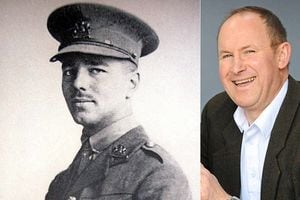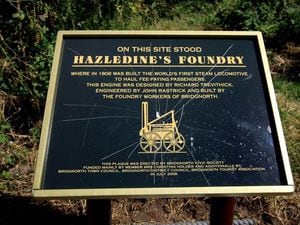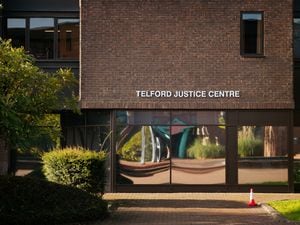Oswestry statue to honour greatest war poet Wilfred Owen
War poet Wilfred Owen will be honoured with a statue in Oswestry, the town of his birth.

The sculpture will stand in Cae Glas Park thanks to a project launched by the Lights Out Trefonen group, Oswestry Town Council and the artist Tim Turner.
It will be unveiled during a week-long World War One festival of commemoration and remembrance culminating on Armistice Day next year.
Wilfred Owen died on the battlefield in France just days before the war ended.
Owen, who was born at Plas Wilmot, Weston Lane, Oswestry, is widely recognised as one of the greatest voices of the First World War.
The unveiling of the sculpture will mark the support and contribution of Oswestry to the landmark centenary.
Friends Chris Woods, from Lights Out Trefonen, and local artist Tim Turner got together to put forward a proposal to Oswestry Town Council.
Mr Woods, who has managed several projects linked to the First World War in the West Midlands, said: "I am delighted and proud that the town council has agreed to support this project.
"Tim and I thought it was very important to ensure such a unique opportunity regarding a double centenary linked to our town didn't pass us by.
"Owen is regarded by many as the greatest poet of the First World War and his works are now an established part of learning and education for young and old alike.
"This project links with national initiatives and as a result is endorsed by the Imperial War Museum and the Wilfred Owen Association.
"I feel it will be a wonderful attribute for the town and will bring in many visitors."
The Wilfred Owen Association, whose president is Peter Owen, the nephew of Wilfred, said it was delighted with the news.
Chairman, Meg Crane, said: "The Wilfred Owen Association is delighted to learn of this project, which will commemorate Wilfred in the town of his birth.
"We would like to express our support for this statue and for the Centenary Festival week in Oswestry.
Sculptor Tim Turner was a pupil at Oswestry School before going on to study at the Royal College of Art.
His recent work includes a bronze bust of King Orllie Anthoine the First, which was unveiled last August in Tourtoirac, France.
Mr Turner said: "I was naturally delighted when the town council approved my design for the Wilfred Owen tribute and I was deeply moved by Chris's passion for this project, knowing his family connections to the Battle of the Somme.
"I think the sculpture will be a great credit to the town as well as attracting visitors.
"There could be no greater honour for a local artist, than to create such a memorial for the beautiful town of Oswestry."
The sculpture will be cast by the Castle Fine Arts Foundry based in Llanrhaeadr, which is renowned for its casting of sculptures all over the world.
Town Mayor, Councillor Paul Milner, said he was thrilled the statue will be created.
He said: "This exciting project recognises the opportunity to provide a legacy for the town and to commemorate Wilfred Owen, arguably our most recognised, famous son.
"It also reflects for generations past and present the impact that the war had on our local community.
"Looking into the future it provides the opportunity for a significant tourism feature."
The town council has agreed to underwrite the project up to a value of £40,000.
The life-size sculpture will be sited at the front of Cae Glas Park looking through the Memorial Gates that have recently been restored by the town council.
Members of the Lights Out Trefonen committee are putting together a week-long festival of activities from November 4 to 11, 2018, to commemorate the centenary of the end of the war and Owen's death.
This will involve schools, local organisations and include musical recitals, drama productions, poetry, a light show, an artist's trail, the lighting of commemorative beacons and the unveiling of the Wilfred Owen sculpture.
Killed in action week before end of war
Wilfred Edward Salter Owen, was born on March 18, 1893, at Plas Wilmot, a house in Weston Lane, near Oswestry.
When war broke out he was working as a private tutor teaching English and French at the Berlitz School of Languages in Bordeaux, France. He considered joining the French army but eventually returned to England.
Owen is regarded by many as the greatest poet of the First World War, known for his verse about the horrors of trench and gas warfare.
Owen was killed in action on November 4, 1918, during the crossing of the SambreOise Canal, exactly one week before the signing of the Armistice which ended the war, and was promoted to the rank of lieutenant the day after his death. It was cruel for his mother when she received the telegram informing her of his death on Armistice Day.
There are currently memorials to Owen at Gailly, Ors, Oswestry, Birkenhead Central Library and Shrewsbury. On November 11, 1985, Owen was one of the 16 Great War poets commemorated on a slate stone unveiled in Westminster Abbeys Poets Corner.





